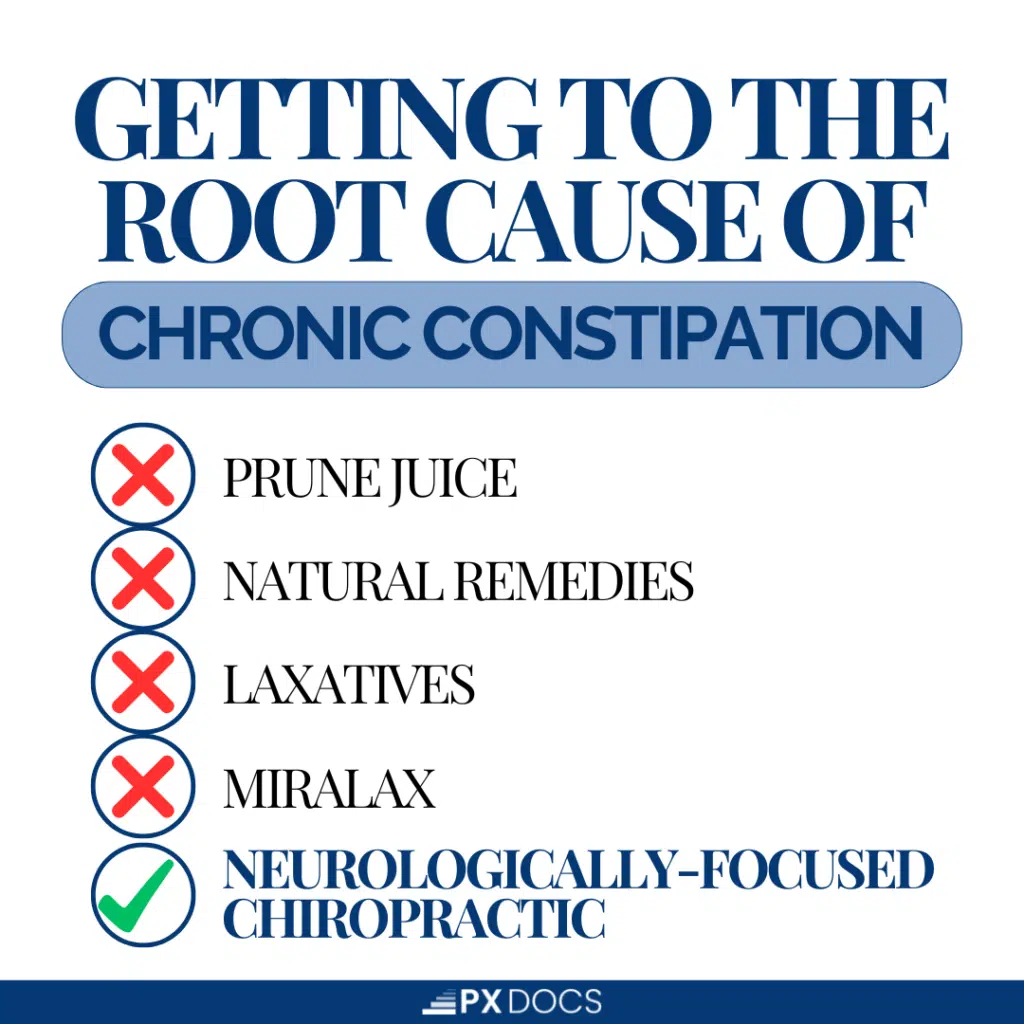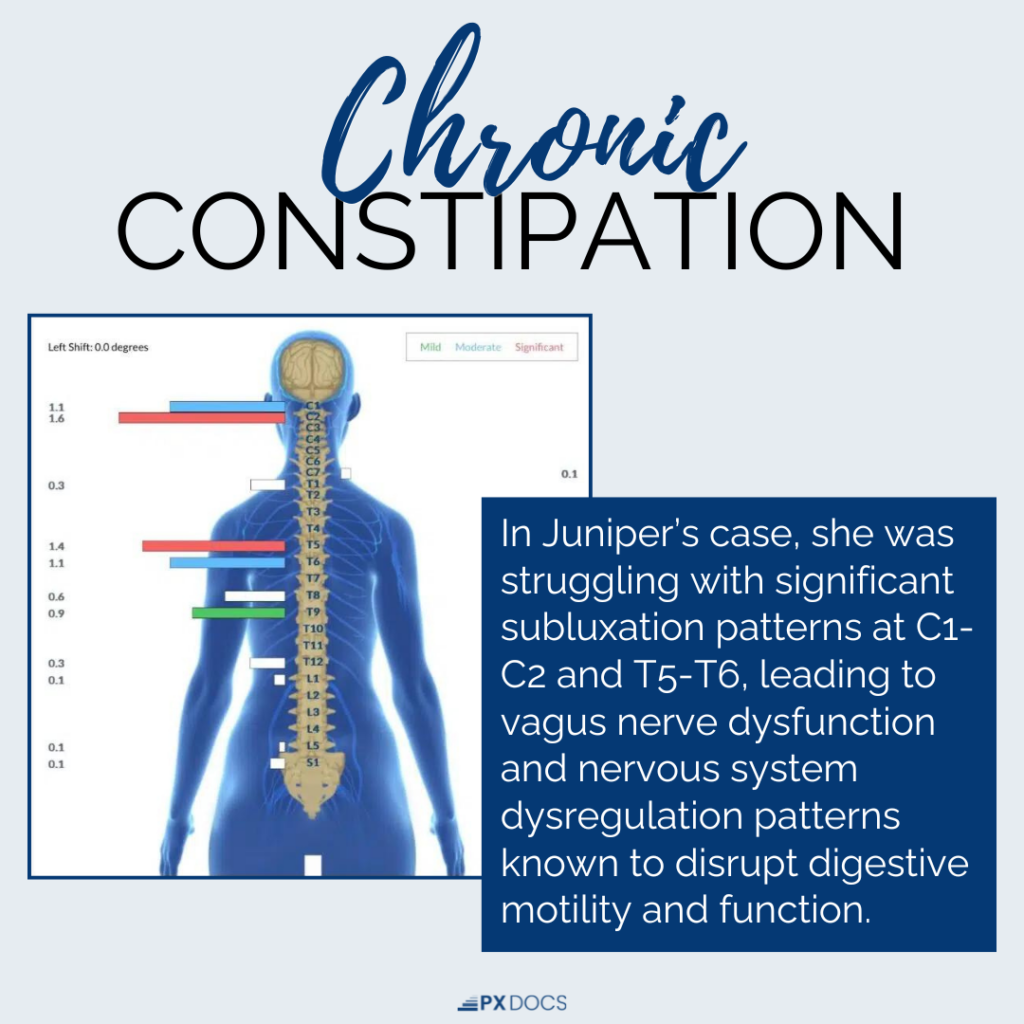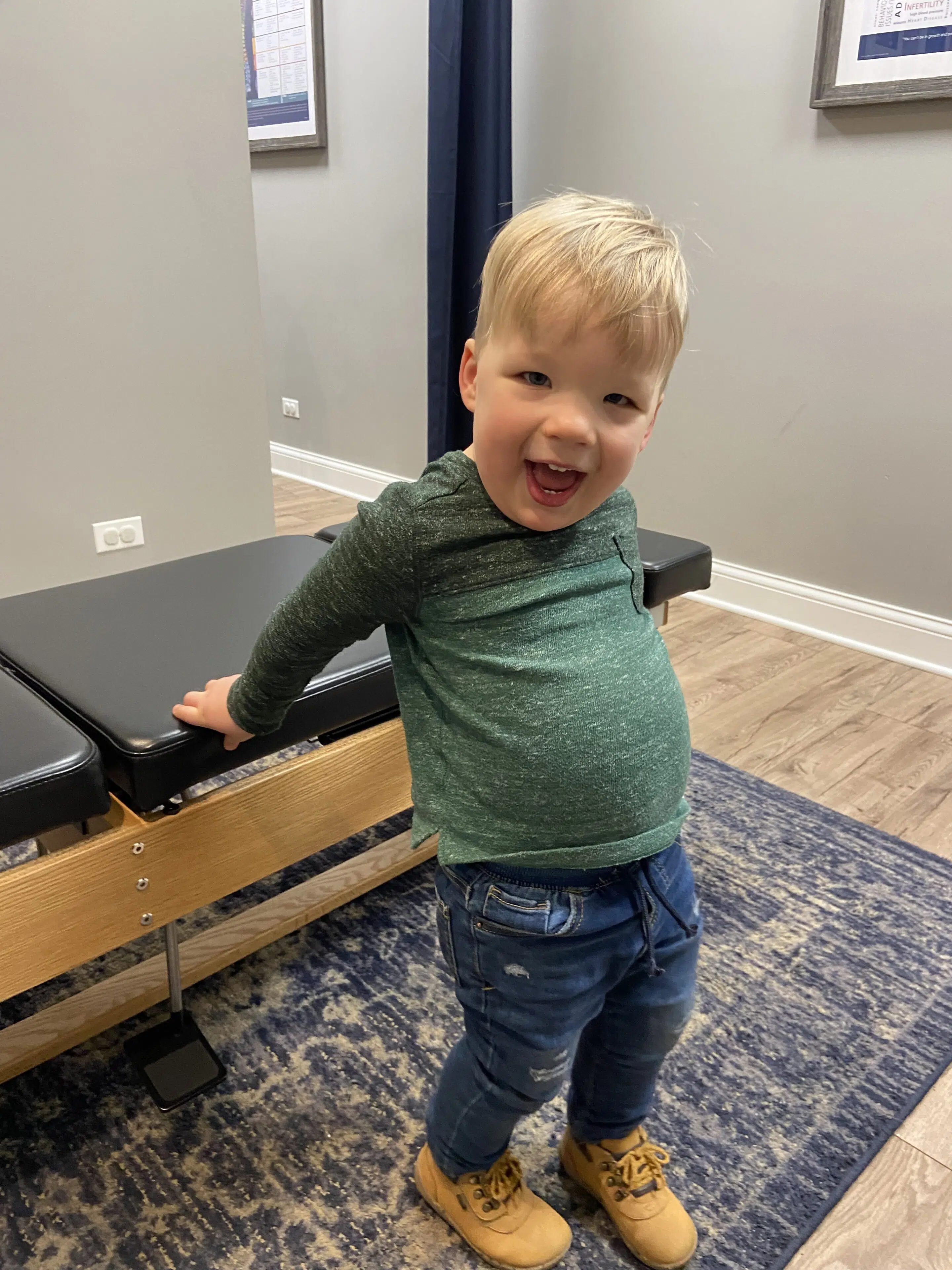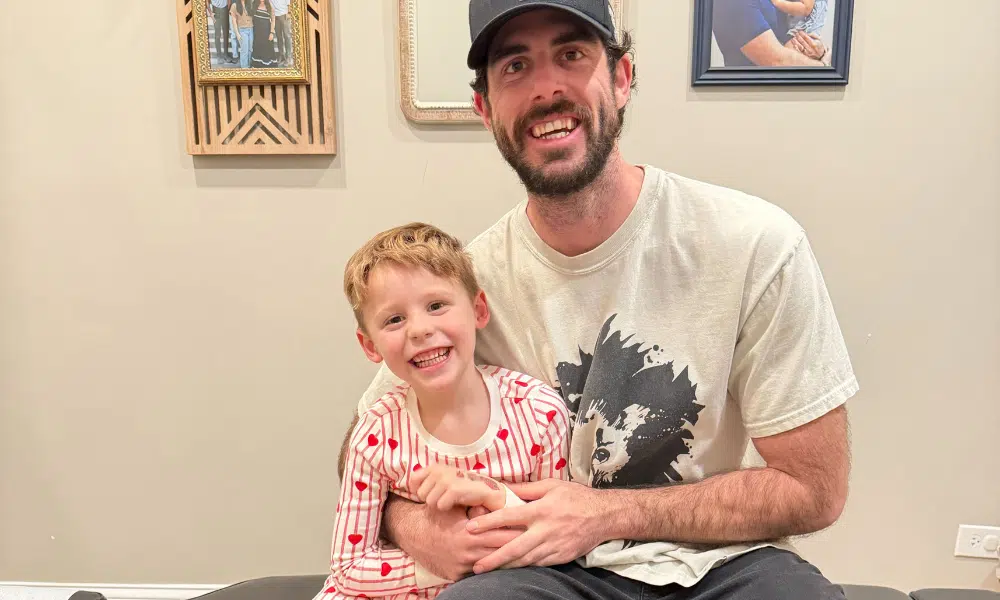Chronic constipation is a common issue affecting up to 30% of children, and it tends to worsen in the preschool and toddler years. However, constipation is not something kids necessarily outgrow. Instead, they may grow into other digestive issues later in life.
Foundational studies have shown that children with a history of chronic constipation are more likely to experience irritable bowel syndrome (IBS) and other gastrointestinal disorders as adults.
If you’ve already tried prebiotics, probiotics, prune juice, a high-fiber diet, and other natural remedies to no avail, or if you’ve resorted to over-the-counter or prescription medications like Miralax (which often come with side effects like behavioral issues and meltdowns) and are still searching for a natural, drug-free option, this article is for you.
At PX Docs, we want to share the number one missing link found in the majority of kids with constipation who present to our clinic. By understanding the nervous system’s role in digestive health and exploring gentle, effective chiropractic care, you may find the answers and hope you’ve been seeking to address constipation’s real root cause once and for all.
What Causes Constipation
Chronic constipation is a condition characterized by infrequent bowel movements, stools that are difficult to pass, or a sensation of incomplete evacuation. In children, it is considered chronic when signs of constipation persist for two or more weeks and with episodes occurring at least once per week.
In children, chronic constipation looks like:
- Infrequent bowel movements (less than three per week)
- Hard, dry, or lumpy stools
- Bowel movements that are painful or difficult to pass
- Abdominal pain, bloating, or discomfort
- Straining or feeling of incomplete evacuation
- Soiling or leakage of stool (known as encopresis)
If left unchecked, chronic constipation can lead to various complications that may impact your child’s quality of life and overall health. These complications include:
- Rectal fissures: Tears in the skin around the anus, caused by passing large or hard stools, which can lead to pain and bleeding.
- Hemorrhoids: Swollen veins in the rectum or anus, resulting from straining during bowel movements.
- Fecal impaction: A buildup of hardened stool in the rectum, which can cause abdominal pain, nausea, and vomiting.
Chronic constipation can be a frustrating and distressing condition for both children and their parents. While dietary changes, such as eating high-fiber meals, and over-the-counter remedies may provide temporary relief, addressing the underlying neurological causes of constipation is crucial for long-term digestive health and well-being.
One easy way to understand that there is a neurological component of constipation is to look at the frequent co-challenges that present with it. The vast majority of patients we care for, who are struggling with ADHD, Autism, and Anxiety, also struggle with constipation and significant gut issues. This is a sure sign or clue that there is more going on in constipation than nutritional and dietary imbalances, and that the deeper root dysfunction lies within nervous system dysregulation.
The Perfect Storm: Factors Contributing to Chronic Constipation
At PX Docs, we recognize that chronic constipation in children often results from a combination of factors that create what we call “The Perfect Storm.” This concept suggests that various physical, chemical, and emotional stressors can accumulate and overwhelm a child’s developing nervous system, setting the stage for chronic digestive issues like constipation.
“The Perfect Storm” can begin before a child is even born, with the mother’s experience of stress and anxiety during pregnancy. Research has shown that maternal stress can significantly impact fetal development, including the development of the nervous system. When a mother experiences chronic stress, her body releases higher levels of stress hormones, such as cortisol, which can cross the placenta and affect the developing fetus.
The process of birth itself can also contribute to the development of chronic constipation, particularly when interventions such as forceps, vacuum extraction, or cesarean section are used. These interventions can cause physical strain and trauma to the baby’s delicate nervous system, leading to misalignment and tension in the upper neck, brainstem, and other components of the neurospinal system.
Even in cases of “normal” vaginal delivery, the intense pressure and twisting forces experienced by the baby’s head and neck can cause significant misalignments and nerve interference, disrupting the normal function of the digestive system.
Early Childhood Stressors
After birth, a variety of common childhood experiences can further contribute to the development of chronic constipation. These early childhood stressors include:
- Environmental toxins: Exposure to harmful chemicals and pollutants can disrupt the delicate balance of the gut microbiome and lead to inflammation and digestive issues.
- Dietary factors: A diet high in processed foods, refined sugars, and artificial additives can alter gut function and contribute to constipation.
- Exposure to Antibiotics: When a child’s still developing and immature digestive and immune systems encounter antibiotics, it can disrupt the delicate balance of their microbiome and contribute to other digestive issues like constipation.
- Emotional stress: Childhood stress, such as family conflicts, school pressures, or traumatic events, can impact the gut-brain connection and exacerbate digestive problems.
When children experience these stressors, their nervous system can become stuck in a state of “fight or flight,” leading to chronic tension and imbalance. This sympathetic dominance can interfere with the child’s ability to rest, digest, and eliminate waste effectively, creating a vicious cycle of stress and constipation.
By understanding “The Perfect Storm” of factors contributing to chronic constipation, parents and healthcare providers can work together to address the root causes and support the child’s overall digestive health and well-being.

The Role of the Nervous System in Digestive Motility
Exploring the intricate relationship between the nervous system and digestive function is essential to fully understanding how chronic constipation develops in children. The central nervous system (CNS) and autonomic nervous system (ANS) play a crucial role in regulating digestive motility, and any imbalances or dysfunction within this system can contribute to chronic constipation.
The ANS consists of two main branches:
- The sympathetic nervous system (SNS): Often referred to as the “fight or flight” response, the SNS is activated during times of stress or perceived danger. When the SNS is dominant, it can slow down digestive processes, leading to constipation.
- The parasympathetic nervous system (PNS): Known as the “rest and digest” response, the PNS promotes relaxation, digestion, and bowel movements. The vagus nerve, the longest cranial nerve in the body, is a key component of the PNS and plays a vital role in regulating digestive function.
Subluxation refers to misalignments or distortions in the neurospinal system that can interfere with proper nerve communication between the brain and the body. When subluxations occur in the upper neck and brainstem region, they can disrupt the function of the vagus nerve and other autonomic nervous system components, leading to digestive issues like constipation. Additionally, subluxations found lower throughout the transitional and sacral regions of the neurospinal system can disrupt and delay motility and nerve function as well.
Various factors, including birth trauma, physical injuries, and chronic stress, can cause subluxation. When left unaddressed, subluxations can create a state of dysautonomia, where the balance between the sympathetic and parasympathetic nervous systems is disrupted, leading to a wide range of health challenges, from chronic constipation to irritable bowel syndrome and more.
Limitations of Conventional Constipation “Treatments”
When children experience chronic constipation, parents often turn to conventional treatments for relief. However, these approaches may have limitations and potential side effects impacting the child’s overall health and well-being.
One common care option for chronic constipation is the use of laxatives, such as Miralax. While these medications can provide temporary relief, they do not address the underlying cause of the problem. Overuse of laxatives can lead to dependence, electrolyte imbalances, and disruption of the gut microbiome. Additionally, some parents have reported behavioral changes and developmental issues in their children after prolonged use of Miralax.
Other conventional options, such as stool softeners or anorectal manometry, may help alleviate symptoms but fail to address the root cause of chronic constipation. By focusing solely on symptom management, these approaches may overlook the crucial role of the nervous system in regulating digestive function.
The PX Docs Approach to Caring for Constipated Kids
At PX Docs, we take a different approach to addressing chronic constipation in children. Our Neurologically-Focused Chiropractic Care aims to identify and correct the underlying nervous system imbalances contributing to digestive issues.
Through gentle, specific chiropractic adjustments, we work to restore proper communication between the brain and the digestive system. We can help improve vagal tone and promote optimal autonomic nervous system function by addressing subluxations, particularly in the upper neck and brainstem region.
The long-term benefits of Neurologically-Focused Chiropractic Care for children with chronic constipation include:
- Improved digestive motility
- Better overall nervous system function
- Drug-free and non-invasive approach
- Customized care plans based on the child’s unique needs
During a chiropractic visit at PX Docs, parents can expect a comprehensive evaluation of their child’s nervous system function. Using advanced technology, such as the INSiGHT scanning system, our doctors can identify areas of subluxation and dysautonomia that may be contributing to chronic constipation.
Based on these findings, we develop personalized care plans that incorporate gentle, specific chiropractic adjustments to restore balance to the nervous system. Our approach is tailored to each child’s needs, ensuring the best possible outcomes for their digestive health and overall well-being.
Juniper’s Story of Hope and Healing from Severe Constipation
At just five months old, Juniper was struggling with severe constipation, going days without a bowel movement. Despite her mother’s best efforts to alleviate her discomfort through dietary changes and natural remedies, Juniper continued to suffer.
When Juniper’s mother brought her to PX Docs, our team thoroughly evaluated her using the INSiGHT scanning system. The scans revealed significant subluxations in Juniper’s upper neck and mid-back regions, indicating interference with the vagus nerve and digestive function.

Through a series of gentle, specific chiropractic adjustments, we worked to restore balance to Juniper’s nervous system. As her care progressed, she went from extreme constipation to pooping on her own as she experienced more regular, comfortable bowel movements multiple times a day.
Juniper’s story is just one example of how addressing the root cause of chronic constipation through Neurologically-Focused Chiropractic Care can transform a child’s health and quality of life.
If you want more, read Shelby’s story.
Natural, Long-Term Solutions for Improved Bowel Habits
Chronic constipation can be a challenging and frustrating issue for both children and their parents. By understanding the nervous system’s role in digestive health and exploring the potential of Neurologically-Focused Chiropractic Care, parents can take a proactive approach to finding natural, long-term solutions for their child’s well-being.
At PX Docs, we are committed to empowering parents with the knowledge and resources to make informed decisions about their child’s health. Suppose you suspect that your child may be struggling with chronic constipation due to nervous system imbalances. In that case, we encourage you to visit the PX Docs Directory to find a qualified practitioner near you.
By addressing the root cause of chronic constipation and supporting the body’s innate ability to heal, Neurologically-Focused Chiropractic Care can get your child pooping naturally again.





